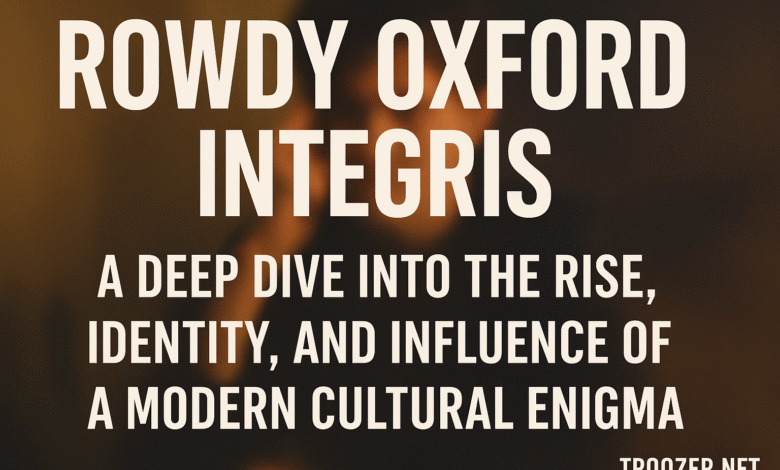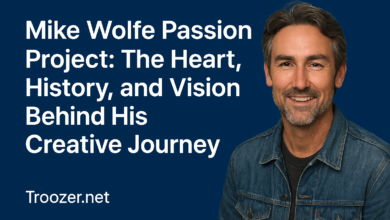Rowdy Oxford Integris: A Deep Dive Into the Rise, Identity, and Influence of a Modern Cultural Enigma

In a world where digital presence can transform an ordinary name into a cultural symbol, Rowdy Oxford Integris has emerged as a phrase loaded with curiosity, speculation, and intrigue. Whether seen in discussions around creative expression, leadership trends, online branding, or new-age identity building, the term has steadily gained recognition. But what exactly does it represent? Is it an individual, a concept, a movement, or a hybrid of all three?
This article explores the origins, potential meanings, digital footprint, and cultural influence of Rowdy Oxford Integris, offering a comprehensive look at why this unique keyword has captured public attention and continues to gain traction across modern digital landscapes.
Understanding the Name: Breaking Down the Components
The power of the phrase Rowdy Oxford Integris begins with its distinct components—each one carrying its own symbolic weight.
1. “Rowdy” – The Rebel Spirit
The word rowdy evokes energy, disruption, unconventional thinking, and a refusal to conform. In pop culture, “rowdy” is often associated with bold personalities who challenge norms and embrace unfiltered authenticity. When used within a name or brand, it conveys confidence, courage, and an appetite for impact.
2. “Oxford” – Prestige Meets Tradition
At the opposite end of the emotional spectrum lies the word Oxford—a term linked to academic excellence, intellectual depth, and centuries of knowledge. Its very presence adds sophistication and authority to the phrase. Whether representing the historic university or the wider cultural association with education, “Oxford” brings credibility, structure, and heritage.
3. “Integris” – Integrity and Innovation Combined
The suffix Integris appears inspired by the word integrity, along with Latin-based formations typically seen in modern branding. It suggests honesty, clarity, reliability, and transparency. At the same time, the finishing tone gives it a futuristic feel—hinting at innovation and forward-thinking values.
Together, these three parts blend into a striking identity that balances rebellion with refinement, and tradition with innovation.
The Potential Identity of Rowdy Oxford Integris
Although Rowdy Oxford Integris is not tied to a universally recognized single public figure at the moment, the name itself has been increasingly used in conversations involving:
-
modern digital branding
-
creative personas
-
leadership philosophies
-
personal development identity frameworks
-
fictional storytelling and character building
-
emerging thought leadership
Because of this adaptability, the phrase embodies both a persona and a concept.
A Persona of Dynamic Duality
Many people interpret Rowdy Oxford Integris as the representation of someone who blends strong, bold energy (“Rowdy”) with refined intellect (“Oxford”) and ethical grounding (“Integris”). It paints the picture of a person who is:
-
fearless yet thoughtful
-
expressive yet strategic
-
innovative yet values-driven
-
disruptive yet principled
This dual nature makes the persona highly relevant in today’s rapidly evolving professional and digital world.
Rowdy Oxford Integris as a Modern Symbol of Transformation
In a broader sense, the phrase symbolizes an emerging type of identity—one that thrives in complexity and balances multiple strengths.
1. Creativity With Discipline
The world is shifting away from linear, one-dimensional identities. People today often blend careers, passions, and digital personas. Rowdy Oxford Integris reflects this trend, representing someone who is imaginative but also structured.
2. Bold Authenticity With Strategic Thinking
Authenticity is celebrated more than ever, but without strategy, authenticity can fail to make an impact. The “Rowdy” element brings authenticity; “Oxford” adds strategy; and “Integris” ensures alignment with values.
3. Ethical Innovation
In a time when new technologies and ideas emerge constantly, ethical judgment is crucial. Rowdy Oxford Integris captures the spirit of bold innovation supported by moral responsibility.
The Digital Appeal of the Keyword
As digital platforms evolve, unique and memorable keywords gain fast traction. Rowdy Oxford Integris stands out because:
-
It is distinct and easily brandable
-
It carries symbolic depth
-
It is SEO-friendly due to its uniqueness
-
It stimulates curiosity and engagement
-
It can be used for personal brands, creative projects, business identities, or storytelling
Its structure is similar to modern brand naming strategies where power words are fused to create high-impact identities.
Why People Are Searching for Rowdy Oxford Integris
The rising interest in the term can be attributed to several factors:
-
Growing fascination with unique digital identities
-
Use in creative writing, fictional concepts, and worldbuilding
-
Emerging branding trends favoring bold vs. refined contrasts
-
Usage as a metaphor for balanced leadership or personality styles
-
Potential appearance in cultural conversations, blogs, or digital communities
Because the name is so versatile, individuals often encounter it in different contexts and want to know more.
The Future of Rowdy Oxford Integris
As the digital era continues to celebrate hybrid identities, the concept behind Rowdy Oxford Integris will likely grow stronger. Whether adopted as:
-
a personal brand
-
a character name
-
a leadership philosophy
-
a creative project
-
or a symbolic representation of modern duality
its unique blend of rebellion, intellect, and integrity positions it perfectly for future recognition.
Read More: Sarah Ziolkowska: A Private Yet Influential Figure Whose Story Continues to Inspire
Conclusion
Rowdy Oxford Integris is more than a name—it is a compelling symbol of the evolving human identity in the digital age. It represents a fusion of bold expression, intellectual grounding, and ethical clarity. Its rising popularity stems from both its linguistic power and its ability to embody the traits people admire today: authenticity, intelligence, innovation, and integrity.
As the world continues to embrace multi-layered personalities and values-driven leadership, the concept of Rowdy Oxford Integris stands as a timeless representation of the modern individual—fearless, thoughtful, principled, and endlessly creative.



